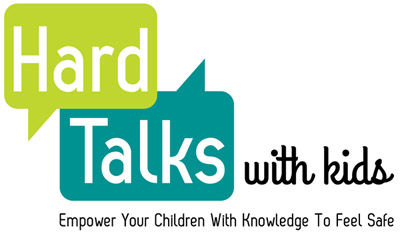

Preparing Yourself for a Hard Conversation with your Child – by Michelle Chalfant
hard talks September 30, 2016 admin 1

Navigating a Scary World
The world in which we live seems to be getting scarier and more dangerous every day. News headlines shout at us about every conceivable threat to our safety and well-being.
Our children are constantly exposed to these scary message at home, at school, from friends or as they pass the innumerable TVs that seem to be in every restaurant and waiting room. The problem is that most children do not have the brain development, experience or context to make sense of these threats.
As parents, it is our responsibility to talk with our children to help them understand and process the world around them, but most parents are not sure how to handle these conversations. In fact, most adults have never been taught how to have tough conversations with children, spouses, friends, bosses, etc.
As a coach, speaker, author and podcaster, I teach people a model called The Adult Chair that helps them deal with life’s challenges from a centered and proactive place instead of reacting based on sub-perceptual emotions and outdated strategies. By providing you with some of the basic steps from The Adult Chair, I will help prepare you for any tough conversations with your kids. This will lead to better outcomes for your children and less stress for you.
In addition, you can also teach your children these basic steps so that they have a way to process and handle tough situations in their life. We would all enjoy life more if we had been taught strategies and processes for dealing with life.
Here are four steps from The Adult Chair that will set you up for success in talking with your children and will also give your children an introduction to a powerful process that will serve them for the rest of their lives.
- Become Aware of Your Emotions
When people react poorly, it is usually because they are unaware that they are caught up in their emotions. Something has triggered them and they react with fear, anger or any number of other negative emotions. Seeing video on the TV from the latest shooting scene is a great example of a powerful trigger that moves people into fear.
Instead of sitting, getting clear, collecting facts and speaking from a place of calm, we often react negatively to an event and then speak to our kids from a place of fear. Kids are very good at sensing emotions, so our fear is transferred to them. Before we even begin speaking, our kids are already in a place of fear and anxiety. As you can imagine, most people don’t listen and process information well when they are scared or anxious.
When preparing to talk with your children, take a moment to sit quietly and notice what you are feeling. Are you scared or anxious? Tough conversations always go better when you are calm and clear. Before you begin anything in life, take a moment to check in and see how you are feeling.
Once you get better at becoming aware of your own emotions, begin teaching your children how to check in on their emotions. If something comes up for them at school (or anywhere), invite them to feel their emotions. Ask them what they feel when they are talking about a certain issue they are dealing with. Remain present with them and just listen. This is incredibly powerful as there is nothing to fix. The key is to teach and model for them how to feel a feeling and not fix it. Being present with another while they express a feeling is one of the most powerful acts of compassion we can do.
As a parent, it is our job to be with our kids and with them in their emotions. This does not mean that we guide them to only feel positive emotions. This is an extremely important life skill to model for our children and probably one of the most important life skills that anyone can have. Unfortunately, most are never taught this at home or at school but it is never too late to learn or to teach our children.
- Get Centered
Once you are aware of your emotions, allow yourself to feel them. Sitting and taking a few, slow, deep belly breaths is a wonderful exercise that helps emotions to pass through us. This Belly Breath (see video below) releases relaxation hormones and activates the parasympathetic nervous system. This simple breath creates a sense of calm in the body and helps us to slide into our Adult Chair. From here, we can have a calm, centered conversation with our kids.
Meditation is also a great practice that can center you in the moment but also will help with emotional awareness and control long term.
- Identify Truth
Negative emotions and the media tend to cause us to ignore the facts and focus on the worst-case scenario. When triggered into fear, our ego gets engaged, and we make up stories or assumptions. This includes attempting to guess what the future will hold and how we will protect ourselves and our children.
Once centered, and in this healthy adult version of ourselves, we find our thinking slows down and we recognize that we are trapped in a story or assumption. We then can reach for “what’s fact or truth.”
Think like a reporter ONLY looking for the facts for his article. For example, there was a bombing in Chelsea Park in NYC. 15 people were injured. It’s near my home. I feel on guard and afraid that it may happen to our neighborhood. I don’t know if it ever will.
This takes all of the guessing out of it. We may also add other facts like the odds of being kidnapped, involved in a school shooting or being injured in a terrorist attack are many times lower than dying in a car accident, being accidentally shot by someone you know, drowning in a pool or even getting hit by lightning.
When we are not in a state of fear, we can look at threats from a broader perspective. This allows us to honestly assess a threat.
- Prepare for Trouble
Although most threats are not likely to happen to us, it is still wise to have an idea of how to handle these situations. Once we have provided our children with an objective (as opposed to fear-based) explanation of a threat, we can then calmly talk with them about how to respond if something bad does happen.
It will also make them feel more confident to know that they are prepared in case of an emergency.
This is obviously a very short summary of The Adult Chair, but it will help you prepare for the tough conversations with your children.
The key to tough conversations with your children is not as much the topic to speak of or to avoid but instead your energy when you have these conversations.
Our children “read” our energy and look to us for safety. Our children look to us for guidance and for us to be their wise leader and their rock. How you handle these early conversations with your children will help them grow into strong, clear, healthy adults that are able to navigate a chaotic world.
It will help you navigate the challenges in life as well.
Subscribe to Hard Talks With Kids
Michelle Chalfant MS, LPC, CHC, is a therapist, holistic life coach, speaker and author dedicated to helping individuals and couples uncover their true and whole selves by stripping away limiting beliefs, false stories and emotional masks. Michelle has proven that increasing self-awareness is the first step to self love. Her Adult Chair model for self-love and understanding is practiced worldwide. This model is used to help people understand their inner child, adolescent (ego) and healthy adult more intimately, and in doing so become able to identify the source of their limiting emotional response to the world around them. Michelle’s work provides a path toward healing and growth and a life lived from the Adult Chair. Michelle is host of The Adult Chair podcast, and her writing and guided meditations support thousands of listeners, readers and students. For more information on The Adult Chair and Michelle’s work, visit her website or find her on Twitter.

Janai
October 24, 2016 #1 AuthorAt last, sonmeoe who comes to the heart of it all